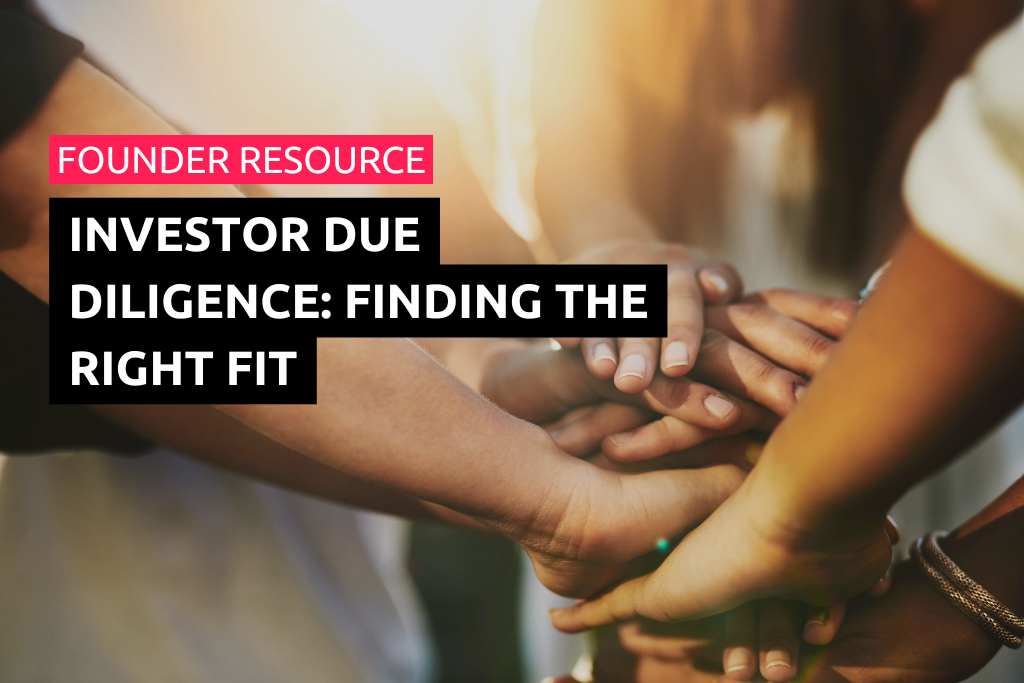
Investor Due Diligence: Finding the Right Fit
Founder ResourceWhen it comes to building your startup, choosing the right investor is one of the most important steps you’ll take. It’s not just about securing funding—it’s about finding someone who believes in your vision, aligns with your values, and adds value beyond the cheque. With a bit of due diligence, you can ensure you’re bringing on investors who’ll help you grow, not hold you back.
Angel investors, who typically invest their own money in early-stage startups, differ from venture capitalists (VCs). Angels tend to be more hands-on and approachable, while VCs manage pooled funds and often invest at later stages. Conducting due diligence on angel investors is usually simpler since their operations are less layered. But simplicity doesn’t mean skipping the process—it’s essential to know who you’re inviting into your business.
Lessons from Experience
Over the years, I’ve seen founders find themselves in difficult situations because they overlooked key red flags when bringing on angel investors. I’ve seen investors be pushy—pressuring founders to close funding rounds prematurely, demanding a say in board meetings, and trying to influence the direction of the business in ways that weren’t helpful.
False promises are another big issue. Some investors commit to deals they can’t (or won’t) follow through on, and by the time the cheque doesn’t land, it’s often too late. These situations can leave founders scrambling for cash or compromising their vision to satisfy someone who’s not really invested in the long-term success of the business.
These aren’t just cautionary tales—they’re reminders of how important it is to do your homework before making a deal.
Red Flags to Watch Out For
While there are many great angel investors out there, here are some warning signs to be mindful of:
-
Unrealistic Expectations
Some investors expect quick returns, even in industries that require patience and long-term growth. Misaligned timelines can create unnecessary tension, so clear communication is key. -
Reputation Concerns
If an investor has a history of failed ventures, legal troubles, or questionable ethics, take it as a warning. Speak to other founders they’ve worked with and don’t hesitate to dig into their track record. -
Overly Hands-On Involvement
Guidance is valuable, but some investors can overstep—micromanaging or trying to steer the business away from your vision. A good investor offers support without taking control. -
Equity Demands That Don’t Add Up
Early equity is a precious resource. Be cautious with investors who demand an excessive stake, as this can complicate future fundraising and dilute your ownership. -
Reluctance to Formalise Agreements
If an investor avoids putting key terms like equity splits or vesting schedules into writing, it’s a risk. Verbal agreements offer little protection in case of disagreements. -
Lack of Transparency
An investor who is evasive about their finances, funding sources, or overall intentions should raise a red flag. Transparency is fundamental to trust.
Practical Steps for Due Diligence
The good news? Protecting yourself doesn’t have to be complicated. Here’s how to get started:
-
Search Online
Start with the basics: plug the investor’s name and businesses into a search engine. Don’t stop at the first page—dig deeper to uncover the full picture. -
Check Companies House (for UK investors)
Companies House is a goldmine of information, from financial records to strike-off warnings. Use it to review an investor’s business dealings. -
Talk to Other Founders
Speak to founders they’ve worked with in the past. Ask about their experience and whether the investor added value or created headaches. -
Bring in an Expert
If the financial or legal details feel overwhelming—or if you’re dealing with more complex situations—it’s worth consulting an expert.
Final Thoughts
Due diligence isn’t just a box to tick—it’s about safeguarding your vision and ensuring you’re bringing the right people into your company. While red flags don’t always mean you should walk away, they should prompt deeper conversations and closer scrutiny. And when you find the right investor, the difference is night and day. A good partner won’t just bring funding—they’ll bring ideas, connections, and energy that align with your goals.
I’ve seen what happens when founders skip due diligence—it rarely ends well. But I’ve also seen how transformational the right investor relationship can be. Take your time, ask the tough questions, and don’t be afraid to dig into the details. It’s an investment in your business’s future, and trust me, it’s worth it.
Glossary of Terms
-
Angel Investor
An individual who provides financial support to startups, often in exchange for equity or convertible debt. Angel investors typically back businesses at their earliest stages. -
Venture Capitalist (VC)
An institutional investor or firm that provides larger-scale funding to startups, usually at later stages, to help scale operations. -
Companies House
The UK’s official register of companies, providing access to financial accounts, legal filings, and ownership details. -
Strike-Off Order
A notice indicating that a company is at risk of being removed from the Companies House register due to inactivity or non-compliance.
 |
Suraj RanaSuraj Rana is a dynamic start-up and scale-up adviser for Virgin Start-ups, with a passion for helping businesses realise their full potential. As a legal consultant, he specialises in crafting rock-solid commercial contracts and streamlining growth for both bootstrapped and VC-backed ventures. Suraj dives into the heart of a business—refining share structures, perfecting equity distribution, and optimising product and service delivery. With his sharp eye for detail and dedication to scaling smart, he helps brands level up safely, profitably, and with confidence. |